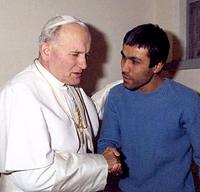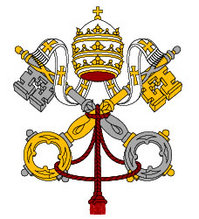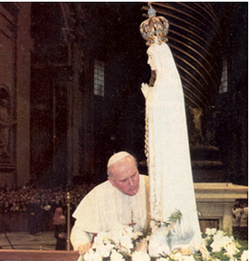 Blessed are you, holy Virgin Mary and worthy of all praise. For the sun of justice, Christ our God, was born of you.
Blessed are you, holy Virgin Mary and worthy of all praise. For the sun of justice, Christ our God, was born of you.
The posture by which we enter into the work of Ecumenism
French Dominican theologian Cardinal Yves-Marie Congar once said: “We
can pass through the doors of ecumenism only on our knees.”
Indulgence given for the Year of the Priest
Today, James
Cardinal Stafford, the Major Apostolic Penitentiary (or visit this link) announced that during the Year for Priests, June 19, 2009 –
June 19, 2010, the Pope Benedict will grant plenary indulgences to priests and
the faithful.
The year will
begin on the Solemnity of the Sacred Heart of Jesus, “a day of priestly
sanctification,” when the Holy Father “will celebrate Vespers before relics” of
Saint John Mary Vianney, patron saint of priests.
In recent years
we’ve been blessed with many favors granted through the pious work of Pope
Benedict. I, for one, am grateful to receive the Pope’s solicitude for my
destiny, for my soul. Why am I happy? I am happy about this because I happen to
think the Pope is a man who enjoys a deep communion with the Lord and he is
guided by the Holy Spirit. His spiritual paternity is one that connects with my
desires to be a man prayer grounded in my desires for communion with God and
neighbor. I don’t want to be controlled by sin; I don’t want to be a sinner all
my life; I don’t want to be ungrateful for the gifts I’ve received from the
Lord: life, parents and family, friends and colleagues, humor and intellect,
desire and faith, etc. Life is not easy. Christian living is even tougher some
days and I know what I am capable of and what I am not. Two favorite scripture
passages that focus my attention in daily living are: “O God, be merciful to me
a sinner” and “Lord, I believe, help my unbelief.”
What is
distressing about some of the criticism about indulgences is the ignorance of intelligent
Catholics. There is a group of people who lack understanding of a sense of
grace and mediation of the Church for our salvation are highly skeptical about
the resurgence of talk on indulgences. You ask what is an indulgence and why
are we speaking about indulgences again. In short, the point of an indulgence is that it “intends as its primary aim to stimulate the faithful in their fervor of charity, and thereby in the worthy reception of the Sacraments and the carrying out of the works of mercy and penance.” More information can be gained by
reading the article at this link.
The means to
obtain the indulgence, this favor, are as follows:
(A) All truly
penitent priests who, on any day, devotedly pray Lauds or Vespers before the
Blessed Sacrament exposed to public adoration or in the tabernacle, and …
offer themselves with a ready and generous heart for the celebration of the
Sacraments, especially the Sacrament of Penance, will be granted a Plenary
Indulgence, which they can also apply to their deceased confreres, if in
accordance with current norms they take Sacramental Confession and the
Eucharist and pray in accordance with the intentions of the Supreme Pontiff.
Priests are furthermore granted a Partial Indulgence, also applicable to
deceased confreres, every time they devotedly recite the prayers duly approved
to lead a saintly life and to carry out the duties entrusted to them.
(B) All truly
penitent Christian faithful who, in church or oratory, devotedly attend Holy
Mass and offer prayers to Jesus Christ, supreme and eternal Priest, for the
priests of the Church, or perform any good work to sanctify and mold them to
His Heart, are granted a Plenary Indulgence, on the condition that they have
expiated their sins through Sacramental Confession and prayed in accordance
with the intentions of the Supreme Pontiff. This may be done on the opening and
closing days of the Year of Priests, on the 150th anniversary of the death of
Saint John Mary Vianney, on the first Thursday of the month, or on any other
day established by the ordinaries of particular places for the good of the
faithful.
The elderly, the
sick and all those who for any legitimate reason are unable to leave their
homes, may still obtain a plenary indulgence if, with the soul completely
removed from attachment to any form of sin and with the intention of observing,
as soon as they can, the usual three conditions, “on the days concerned,
they pray for the sanctification of priests and offer their sickness and
suffering to God through Mary, Queen of the Apostles.”
A partial indulgence will be offered to the faithful each time they pray five “Our Father,” “Hail Mary,” and “Glory Be,” or any other duly approved prayer “in honor of the Sacred Heart of Jesus to ask that priests maintain purity and sanctity of life.”
Do we believe in a God who liberates us and the world as a place of freedom
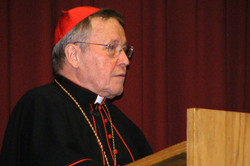 On March 26th, Walter Cardinal Kasper, 76, president of the Pontifical Council for Promoting Christian Unity delivered the annual Fay Vincent Fellowship in Faith and Culture lecture at Saint Thomas More Catholic Chapel & Center at Yale University. The title of his talk was “The Timeliness of Speaking of God: Freedom and Communion as Basic Concepts of Theology.” Here are four salient points in the Cardinal’s address:
On March 26th, Walter Cardinal Kasper, 76, president of the Pontifical Council for Promoting Christian Unity delivered the annual Fay Vincent Fellowship in Faith and Culture lecture at Saint Thomas More Catholic Chapel & Center at Yale University. The title of his talk was “The Timeliness of Speaking of God: Freedom and Communion as Basic Concepts of Theology.” Here are four salient points in the Cardinal’s address:
Easter springs anew
Lauren’s 38th Birthday
Mother’s Day with the Z’s
The priest
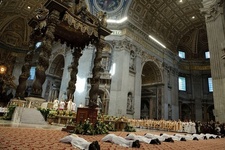
Bishop William Lori ordained two men to the diaconate today; they’ll be ordained priests next year. Saturday, May 16, the Bishop ordains six men to the priesthood. These are happy days for the diocese of Bridgeport. So, I was thinking about the priesthood and what it means. While there are vast amounts of literature on nature of the priesthood, I thought Saint John Vianney would be an appropriate sounding board for today.
The
priest is not a priest for himself; he does not give himself absolution; he
does not administer the Sacraments to himself. He is not for himself, he is for
you. After God, the priest is everything. Leave a parish twenty years without
priests; they will worship beasts. If the missionary Father and I were to go
away, you would say, “What can we do in this church? there is no Mass; Our Lord
is not longer there: we may as well pray at home.” When people wish to destroy
religion, they begin by attacking the priest, because where there is no longer
any priest there is no sacrifice, and where there is no longer any sacrifice
there is no religion.
Saint
John-Mary Vianney, The Little Catechism of the Cure of Ars
Saint Isaiah
 With a great voice like that of a trumpet,
With a great voice like that of a trumpet,
You proclaimed the coming of Christ to the world.
You were revealed as a swiftly-writing scribe of the things to come;
Therefore, we acclaim you with hymns,
Most illustrious prophet Isaiah. (Troparion, Tone 4)
Endowed with the gift of prophecy,
Prophet-martyr Isaiah, herald of God,
You made clear to all the incarnation of Christ
By proclaiming with a great voice:
“Behold, the Virgin shall conceive in her womb.” (Kontakion, Tone 2)
What does justice/rectitude require?
Justice/rectitude requires reason because “… a nature which does not know rightness is not able to will it.”
